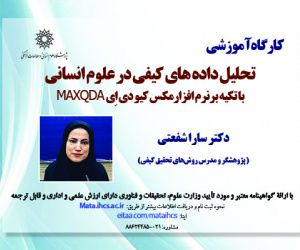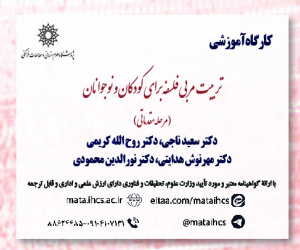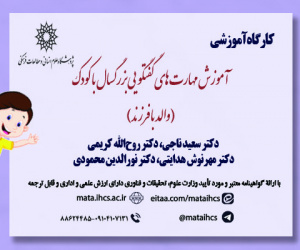مروری بر کاربرد پژوهش عملیاتی در عملیات امداد و نجات (مقاله علمی وزارت علوم)
درجه علمی: نشریه علمی (وزارت علوم)
آرشیو
چکیده
مقاله مروری در زمینه "کاربرد پژوهش عملیاتی در عملیات امداد و نجات" می تواند به عنوان یک منبع ارزشمند برای توسعه و بهسازی روش ها و فرایندهای عملیات امداد و نجات مورد استفاده قرار گیرد. در این مقاله، نحوه ی استفاده از اصول و تکنیک های پژوهش عملیاتی برای بهبود عملکرد این عملیات بررسی شده است. یکی از موارد اصلی که در این مقاله مورد بررسی قرار گرفته است، بهینه سازی است. بهینه سازی در امداد و نجات می تواند به صورت تخصصی در زمینه هایی همچون برنامه ریزی مسیر حمل ونقل، تخصیص منابع، مدیریت زمان و افزایش کارایی عملیات مورد استفاده قرار گیرد. علاوه بر این، این مقاله به دستاوردهای مهمی که با استفاده از روش های پژوهش عملیاتی در حوزه عملیات امداد و نجات به دست آمده است، اشاره می کند. این دستاوردها شامل بهبود عملکرد، کاهش زمان و هزینه ها، افزایش کیفیت ارائه خدمات و بهبود امنیت و کارایی در عملیات امدادی می شود. علاوه بر این، ادغام ابزارهای تحلیلی پیشرفته و مدل های شبیه سازی می تواند دیدگاه های عمیق تری نسبت به سناریوهای پیچیده امداد و نجات فراهم کند. با استفاده از تصمیم گیری مبتنی بر داده، تیم های امداد می توانند چالش های احتمالی را پیش بینی کرده و استراتژی های مؤثرتری تدوین کنند. همکاری بین پژوهشگران و مجریان عملیات برای اطمینان از اینکه پیشرفت های نظری بهبودهای عملی را به دنبال دارد، حیاتی است. با پیشرفت فناوری، ادغام نوآوری هایی مانند هوش مصنوعی و یادگیری ماشینی در پژوهش عملیاتی می تواند قابلیت های عملیات امداد و نجات را بیشتر کرده و آنها را در برابر وقایع غیرمنتظره تطبیق پذیرتر و مقاوم تر کند.An Overview of the Application of Operation Research in Rescue Operations
The integration of advanced analytical tools and simulation models can provide deeper insights into complex rescue and relief scenarios. These tools and models enable rescue teams to analyze and predict potential challenges using real data and precise simulations. Consequently, rescue teams can develop more effective strategies to handle critical situations.Data-driven decision-making is one of the key factors in improving the performance of rescue operations. By utilizing data collected from past operations and analyzing it, patterns and trends can be identified that are effective in optimizing future operations. This approach not only helps in reducing time and costs but also enhances the quality of service delivery and the safety of operations.Collaboration between researchers and operational practitioners is also of special importance. This collaboration can ensure that theoretical and scientific advancements lead to practical and applicable improvements. Researchers can assist operational practitioners by providing new models and methods, helping them to enhance their performance using these innovations.With technological advancements, the integration of innovations such as artificial intelligence and machine learning in operational research can significantly enhance the capabilities of rescue operations. These technologies can help rescue teams analyze large and complex datasets, leading to more accurate predictions and faster decision-making. Additionally, these innovations can make rescue operations more adaptable and resilient to unexpected events.Ultimately, the importance of continued research and the development of research topics in this field for improving the rescue and relief operations system becomes clear. Ongoing research can lead to improved preparedness and performance in facing emergencies and rescue necessities. These studies can help identify the strengths and weaknesses of existing systems and provide new solutions for their improvement.Background & Purpose:The review article on “The Application of Operational Research in Rescue Operations” can serve as a valuable resource for the development and enhancement of rescue operation methods and processes. This article examines how the principles and techniques of operational research can be used to improve the performance of these operations.Methodology:This article explores how the principles and techniques of operational research can be utilized to enhance the performance of rescue operations. One of the main aspects examined in this article is optimization. Optimization in rescue operations can be specifically applied in areas such as transportation route planning, resource allocation, time management, and increasing operational efficiency.Findings:The article highlights significant achievements obtained through the use of operational research methods in the field of rescue operations. These achievements include improved performance, reduced time and costs, enhanced service quality, and improved safety and efficiency in rescue operations. Additionally, the integration of advanced analytical tools and simulation models can provide deeper insights into complex rescue scenarios. By using data-driven decision-making, rescue teams can predict potential challenges and develop more effective strategies.Conclusion: Collaboration between researchers and operational practitioners is crucial to ensure that theoretical advancements lead to practical improvements. With technological advancements, integrating innovations such as artificial intelligence and machine learning into operational research can further enhance the capabilities of rescue operations, making them more adaptable and resilient to unexpected events. Finally, the importance of continued research and the development of research topics in this field for improving the rescue operations system becomes evident. Continued research can lead to improved preparedness and performance in facing emergencies and rescue necessities.According to these studies, it is clear that the use of operational research techniques and methods can significantly help to improve the performance and efficiency of rescue and rescue systems and also be effective in improving the processes of this field. In addition, researches such as the article presented by Jabari and Kazemini (2018) emphasize on optimizing the allocation and distribution of resources in rescue operations using operational research techniques. This view of resource optimization is of particular importance and shows that through the use of operational research methods, it is possible to improve performance and efficiency in rescue operations. These research measures, as a vital dimension in improving the processes and performance of rescue and rescue systems, show a known importance. Similarly, recent researches in the field of optimization of allocation and distribution of resources in rescue and rescue operations have shown that the use of operational research techniques can serve as an effective tool in improving the performance of rescue and rescue operations.






